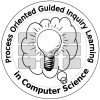| Projects: | NSF TUES 1044679 POGIL in Computer Science NSF IUSE 1626765 POGIL in Introductory CS |
|---|---|
| Acknowledgments: | This material is based upon work supported by the National Science Foundation under Grant DUE-1044679. Any opinions, findings and conclusions or recommendations expressed in this material are those of the author(s) and do not necessarily reflect the views of the National Science Foundation. |
| Collaborators: | Clif Kussmaul, Green Mango Associates; Helen Hu, Westminster College; Chris Mayfield, James Madison University; Aman Yadav, Michigan State University; Matt Lang, Google; Tammy Pirmann, Drexel University; |
CS-POGIL Project Summary
POGIL is based on the biology of learning (e.g. Zull, 2002), and has been developed and validated over the last 15 years, primarily in chemistry education (e.g. Moog, Spencer, 2008). In POGIL, teams of learners (typically 3-5) work on scripted inquiry activities and investigations designed to help them construct their own knowledge, often by modeling the original processes of discovery and research.
The teams follow processes with specific roles, steps, and reports that encourage individual responsibility and meta-cognition. POGIL activities and processes are designed to achieve specific learning objectives. The instructor serves as a facilitator, not a lecturer. Multiple studies have examined the effectiveness of POGIL, and generally find that POGIL significantly improves student outcomes.
The project contains two threads of work. Thread A will develop 8-10 POGIL activities for SE topics including project management and the unified modeling language (UML). Paper versions of these activities will be developed and piloted before the project begins; the project will extend and enhance these activities using laptop or tablet computers. Thread B will develop 8-10 POGIL activities for DS&A topics, including basic data structures, searching, and sorting.
Intellectual Merit: The project leverages and extends the successful POGIL approach to another area (CS), and explores some new directions that could also benefit POGIL in general. The project team includes members with experience developing, adapting, and using POGIL materials and other educational materials, and with wikis and learning management systems for writing and project management.
Broader Impact: The project produces materials for adoption by other CS faculty to improve the quality of CS education, and particularly to improve the performance and retention of average and below average students. The project also seeks to identify and foster a community of CS and SE educators to develop and refine POGIL materials in the future.
